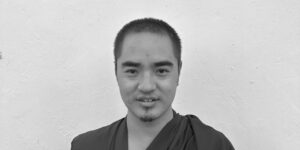
Yeshi Dorje was born and raised in Tawo, an enchanting and beautiful place in eastern Tibet. In 2006, he crossed the great Himalayan mountains and arrived in India . He was enrolled in Gaden Jangtse Monastic University in Mundgod in 2007, where he studied Tibetan Buddhism under the guidance of great masters. He completed all the study of five major texts of Buddhist philosophy with excellent results in 2021. In 2022, he committed to the six-year Gelug exam (equivalent to a PhD in Buddhist Studies) and is currently in his third year, having completed the first two years with flying colors. Additionally, before he was ordained as a monk, he had the opportunity to attend primary and secondary school in Tibet, as well as a year at the Tibetan Children’s Village School, Suja in India. After joining the monastery, he also actively participated in monastic science education. He attended a six-year summer science education program organized by the Emory Tibet Science Initiatives (ETSI), where he studied a wide range of scientific topics, including neuroscience, physics, biology and the philosophy of science, under the guidance of renowned Western scientists and professors. He also completed a five-year Sager Science Leadership Program organized by the Library of Tibetan Works and Archives in collaboration with the Science for Monks and Nuns Institute. During this program, he learned scientific pedagogy and explored topics that intersect scientific and Buddhist studies, such as particles, the five senses, and consciousness. At the end of the program, his cohort created an exhibition titled "Secrets of Particles," which they toured nearby schools and monastic institutions. In 2019, he had the privilege of studying experimentation and research methodology at Moscow State University. Currently, he is researching meditation and tukdam as part of the Tukdam Study in collaboration with scientists from Russia and CHM.
Education
Buddhist Studies, Gaden Jangtse Monastic College
6 years' annual sessions, Summer Science Education Program, Emory-Tibet Science Initiative, Emory University
5 years' annual sessions, Sager Science Leadership Program, co-organized by Library of Tibetan Works and Archives and Science for Monks and Nuns Institute
Links
Related Studies
The Field Study of Long-term Meditation Practitioners and the Tukdam Post-death Meditative State
A global community of field researchers are collaborating on a study of an ancient monastic post-mortem meditative state known as tukdam, practiced by present-day expert Tibetan Buddhists and how such a practice might offer insight into mental, spiritual, and physical well-being during the death process, both for the dying and for their support community.


